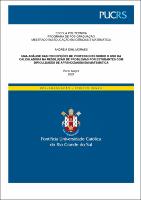| Share record |


|
Please use this identifier to cite or link to this item:
https://tede2.pucrs.br/tede2/handle/tede/9876| Document type: | Dissertação |
| Title: | Uma análise das percepções de professores sobre o uso da calculadora na resolução de problemas por estudantes com dificuldades de aprendizagem em matemática |
| Author: | Moraes, Andréia Dihl  |
| Advisor: | Lara, Isabel Cristina Machado de |
| Abstract (native): | Essa pesquisa tem por objetivo compreender de que modo os professores utilizam a calculadora em sala de aula durante a resolução de problemas e quais implicações de sua utilização para estudantes com dificuldades de aprendizagem. A coleta dos dados foi realizada por meio de questionário online, contemplando 100 professores, dos quais 50 ensinam Matemática nos anos iniciais do Ensino Fundamental e, os outros 50, nos anos finais do Ensino Fundamental e no Ensino Médio, atuantes em 14 estados brasileiros. A pesquisa apresenta um caráter qualitativo, que utilizou como método de análise a Análise Textual Discursiva – ATD, descrita por Moraes e Galiazzi (2011). Com base na análise dos dados, foi possível observar as percepções docentes acerca de problemas, problemas matemáticos, tipos de problemas, dificuldades e transtornos de aprendizagem, tipos de dificuldades percebidas nos estudantes, bem como, as contribuições e desvantagens do uso da calculadora na resolução de problemas utilizados pelos estudantes com dificuldades de aprendizagem. Os resultados mostram que os professores que utilizam problemas em sala de aula, costumam usar problemas convencionais mesmo apontando o uso de problemas não-convencionais e situações-problema. Evidencia que percebem algumas dificuldades de aprendizagem em seus estudantes, pontuando as relacionadas aos transtornos de aprendizagem, desenvolvimento de estratégias, leitura e compreensão textual, identificação de dados e operações e dificuldade de estabelecer relações da Matemática com a realidade. Além desses resultados, aponta que o uso da calculadora facilita a aprendizagem do estudante de forma geral, auxilia na verificação de resultados, oportuniza reflexão e criação de estratégias bem com, otimiza o tempo de resolução na resolução de problemas. Em relação aos estudantes com dificuldades de aprendizagem acrescenta-se a elevação de auto-estima, a inclusão do estudante no grupo, o estímulo à criatividade, o auxílio na compreensão de conceitos, o aumento da motivação e performance do aluno, o auxílio ao reconhecimento dos símbolos matemáticos, o desenvolvimento do senso crítico, a diminuição do stress frente à Matemática, além de oportunizar o manuseio da ferramenta. Para concluir a pesquisa, evidencia que os docentes que participaram deste estudo não costumam utilizar a calculadora em sala de aula, porém entendem que o uso da máquina de calcular na resolução de problemas contribui para os estudantes com dificuldades de aprendizagem. |
| Abstract (english): | This research aims to understand how teachers use the calculator in the classroom during problem-solving and what implications of its use for students with learning difficulties. Data collection was carried out through an online questionnaire, covering 100 teachers, of whom 50 teach mathematics in the early years of elementary school and the other 50, in the final years of elementary school and high school, working in 14 Brazilian states. The research has a qualitative character, which used the Discursive Text Analysis - DTA, as described by Moraes and Galiazzi (2011). Based on the data analysis, it was possible to observe the teachers' perceptions about problems, mathematical problems, types of problems, difficulties and learning disorders, types of difficulties perceived in students, as well as the contributions and disadvantages of using the calculator in solving problems used by students with learning difficulties. The results show that teachers who use problems in the classroom, usually use conventional problems even pointing out the use of unconventional problems and problem situations. It shows that they perceive some learning difficulties in their students, punctuating those related to learning disorders, development of strategies, reading and textual understanding, identification of data and operations and difficulty in establishing relations between Mathematics and reality. In addition to these results, he points out that the use of the calculator facilitates the student's learning in general, assists in the verification of results, allows reflection and creation of strategies as well, optimizes the resolution time in solving problems. In relation to students with learning difficulties, there is an increase in self-esteem, the inclusion of the student in the group, the encouragement of creativity, the help in understanding concepts, the increase in student motivation and performance, the aid to recognition the mathematical symbols, the development of critical sense, the reduction of stress in the face of Mathematics, in addition to providing the opportunity to handle the tool. To conclude the research, it is evident that the teachers who participated in this study do not usually use the calculator in the classroom, but understand that the use of the calculating machine in problem-solving contributes to students with learning difficulties. |
| Keywords: | Calculadora Resolução de Problemas Dificuldades de Aprendizagem Calculator Problem-Solving Learning Difficulties |
| CNPQ Knowledge Areas: | CIENCIAS HUMANAS::EDUCACAO |
| Language: | por |
| Country: | Brasil |
| Publisher: | Pontifícia Universidade Católica do Rio Grande do Sul |
| Institution Acronym: | PUCRS |
| Department: | Escola Politécnica |
| Program: | Programa de Pós-Graduação em Educação em Ciências e Matemática |
| Access type: | Acesso Aberto |
| Fulltext access restriction: | Trabalho não apresenta restrição para publicação |
| URI: | http://tede2.pucrs.br/tede2/handle/tede/9876 |
| Issue Date: | 31-Mar-2021 |
| Appears in Collections: | Programa de Pós-Graduação em Educação em Ciências e Matemática |
Files in This Item:
| File | Description | Size | Format | |
|---|---|---|---|---|
| Dissertação versão Final_Andreia .pdf | ANDREIA_DIHL_MORAES_DIS | 1.43 MB | Adobe PDF |  Download/Open Preview |
Items in DSpace are protected by copyright, with all rights reserved, unless otherwise indicated.




